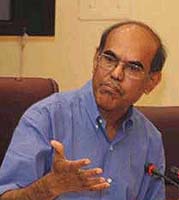|
 The Reserve Bank of India will be closely monitoring the impact of monetary policy on growth and inflation before arriving at any policy decision for the future, the new governor Duvvuri Subbarao said while addressing the media. The Reserve Bank of India will be closely monitoring the impact of monetary policy on growth and inflation before arriving at any policy decision for the future, the new governor Duvvuri Subbarao said while addressing the media.
''All I can say is that we will be monitoring the situation closely and continuously, be mindful of the implications of our monetary stance on the growth prospects, and take action as appropriate,'' Subbarao said. While the RBI has followed a tight money policy in its bid to calm rising inflationary pressures, the Indian economy continued to clock above 8 per cent growth rate amidst the global slowdow, he pointed out. The economy clocked growth of 8.9 per cent on an average annual basis over the last five years. Despite the slow-down in advanced economies, the global financial turmoil and volatile commodity prices, growth in the first quarter of 2008-09, on an annualised basis, was 7.9 per cent – among the highest in the world. India's remarkable economic expansion from an average of 5 per cent in the 90s to close to 9 per cent in the recent period has been led by rise in private consumption, rise in private investment and surge in exports, he said. ''I believe these engines of growth are still on track. The recent moderation is only a cyclical down-turn. The structural India growth story is still intact and credible,'' he said, adding, ''The current high level of domestic inflation reflects a combination of supply-side pressures as well as demand-side factors.'' He said the present inflation is largely a global phenomenon and is being driven by rising demand for key international commodities, especially of crude oil, metals and food. These external pressures are being exacerbated by strong domestic demand pressures, he pointed out. Though demand is not the main problem, in the absence of further flexibility on the supply side, demand management has to be part of the solution. The RBI monetary measures were aimed at dampening demand and anchoring inflation expectations. For sustained economic growth, it is essential that inflation and inflation expectations be contained. Our high growth over the past five years was accompanied by low and stable inflation, and financial stability, he added. ''The intent behind monetary tightening was, in fact, to moderate demand, and hence, some slow-down should not surprise us. What, in fact, is the counterfactual? Not tightening the monetary policy and exposing ourselves to the possibility of a runaway generalised inflation? That too would have eroded confidence in the economy. Indeed, the impact on growth and the impact on the poor may have been more severe under such a situation,'' the RBI governor said. He said the RBI cannot taker a policy stance now since there are several known unknowns. The RBI will be watching the impact of the measures already taken. It will also be watching the drivers of demand – in particular which sectors are triggering the growth in demand. And, in a globalised world, he said, we will also have to be watching developments around the world and make an assessment of their potential impact on our economic management.
Meanwhile, he said the RBI's tight money policy has helped improve the efficiency of the Indian banking sector. The Report on Currency and Finance issued by the RBI last week finds improvement in the efficiency of the Indian banking sector, especially of the public sector banks. Credit growth has been high despite high interest rates, he said, adding, the upward shift in our growth trajectory has been possible because of the higher pace of investment. Investment as a share of GDP, increased from 25 per cent in 2002-03 to 38 per cent in 2007-08. Of this 13 percentage points increase, as much as 10 percentage points was financed domestically through higher household, public sector and corporate savings, according to the RBI report. ''It is in the intermediation of these savings into investments that the Indian financial sector played a key role in our growth story,'' Subburao pointed out.. While the financial sector has become more competitive, the governor said reforms in the sector are needed to make it more competitive, efficient and forward looking. On the way forward, he said, the RBI will look increasingly to the volumes of reports, including the Patil Committee report on corporate bond markets, the Percy Mistry Committee report on making Mumbai an international financial centre and the forthcoming Raghuram Rajan Committee on financial sector reforms. The government and the RBI will also be bringing out, shortly, a comprehensive report of the Committee on Financial Sector Assessment. RBI, he said, will be consulting all stakeholders on the important process on the way forward. The policy, he said, will focus on the liberalisation and development of the financial sector over the last few years that has been a key factor in financing our 9 per cent growth. To sustain and accelerate this growth, financial sector reform, aimed at improved efficiency and financial stability, will remain important, he pointed out.
Financial sector reforms, he said, are not an end in themselves. ''They have meaning and relevance only if they are anchored in real sector objectives and help promote inclusive growth through efficient and easily accessible financial services,'' he added.
|